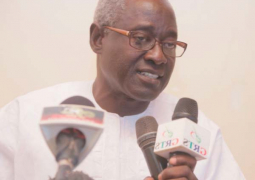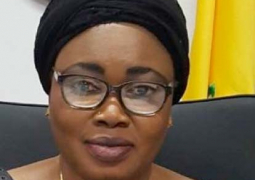
Women small-holders and peasants hold the key to ending hunger. They grow more than 90% of The Gambia's staple food, rice. They usually assume responsibility for household food security, but they lack the required resources to grow sufficient food.
The legally binding Convention on Elimination of all forms of Discrimination Against Women (CEDAW) recognizes that rural women face discrimination in access to means of livelihoods and at the same time that they have a critical role in assuring their families' livelihoods. In Article 14 of the Convention, nation states agreed to adopt all appropriate measures to eliminate discrimination against women in rural areas and enforce their rights to:
1.Organize self-help groups and co-operatives with the aim of gaining equal access to economic opportunities
2. Obtain access to agricultural credits and services, to market and adaptable technologies
3.Have equal treatment in land reform and resettlement plans
4.Enjoy appropriate means of livelihood
In the context of the current global food crisis, there is the need more than ever before for The Gambia and her people to produce enough food to feed the population. Therefore, investment to guarantee women's rights to land and livelihoods and to support women's increased production and income is of utmost importance
To this end this declaration represents demands from women farmers and HungerFREE activists from all the regions in The Gambia for the realisation of a HungerFREE Gambia and to enable rural women to take their rightful place in society.
Our top three policy objectives are:
1. Every woman farmer should have permanent access to, and control over, a minimum of 0.25 ha of good quality farm land.
2. The national budget allocation to the agriculture sector should be increased to at least 10% as agreed in the Maputo Declaration, with a significant percentage allocation of this going to women farmers.
3. Women must be able to access the other productive resources needed to increase food production and income, including labour and time-saving technologies.
Objective 1 - Every woman farmer should have permanent access to, control over, a minimum of 0.25 ha of good quality farm land.
* Women must have permanent ownership and control over the land they work on. Any dispossession (following being widowed, divorced, or deserted) must be condemned and appropriate deterrent measures introduced.
* Women must be given good quality farm land and not marginal land.
* Government must pursue an agrarian reform emphasising women's control and ownership of land.
* The government should set up Land Commissions at different levels and women should be equally represented within them.
* Women must be supported in land development and management.
* A policy must be introduced to protect women's crops against stray and wild animals.
* Local authorities must support women's rights to land and livelihood.
* Women must be given their full inheritance entitlements as prescribed by Sharia and modern law.
* Government should take measures that include, but are not limited to, providing effective rights-based education on women's land rights, training of law enforcement officers and local authorities, and provide legal aid for women to seek redress for violations of their rights.
* Government should protect, uphold and implement international instruments and agreements such as CEDAW, the Protocol to the African Charter on the Human and People's Rights on the Rights of Women in Africa, and the international Conference on Agrarian Reform and Rural Development (CARRD) Declaration.
Objective 2 - The national budget allocation to the agriculture sector should be increased to at east 10% as agreed in the Maputo Declaration, with a significant percentage allocation of this going to women farmers.
* The government budgetary allocation to Agriculture, which stands at less than 4% in 2008, should be increased to at least 10% by the end of 2009.
* This should target smallholder farmers who constitute 75% of the Gambian population, and who are widely recognised as being central to the solution for the food crisis and the long-term problems of poverty and hunger.
* In recognition of the fact that women produce a significant of all locally produced food in The Gambia, the government must significantly increase the percentage of the agriculture budget to specifically target women farmers.
Objective 3 - Women must be able to access the other productive resources needed to increase food production and income, including labour and time-saving technologies
* The government should set up a special program for women to address women's lack of access to farm inputs like fertilizers and seeds.
* In order to enhance the contribution of women in farming without increasing the labour burden on them, the use appropriate technology should be actively promoted.
* Women must be supported to explore surface and underground water to allow for year-round production, increased food security and commercialisation.
* The government should explore access to financing facilities, which are currently beyond the reach of women farmers. They must facilitate the provision of affordable (not high interest) credit without unnecessary restrictions and difficult collateral.
* The government should set up a national agricultural bank.
* The growth of women co-operative societies should be actively promoted and supported.
* Community school farms and gardens should be encouraged in all rural schools for the feeding of school children, especially those in lower basic school.
* Farmers must be able to keep their rights to save, store and regenerate their seeds.
The above declaration is supported by the women farmers who took part in the HungerFREE caravan (15th - 21st October 2008) as well as the following organisations:
Action Aid The Gambia
National Women Farmers' Association
NAYAFS
AFET
ADWAC



